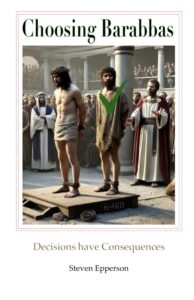We think of cancel culture as a modern phenomenon—something born from social media, hashtags, and viral outrage. But the impulse to publicly condemn someone, to demand their removal from society, is as old as civilization itself. Perhaps no historical example illustrates this more powerfully than the story of Jesus and Barabbas, a moment when mob mentality and social pressure converged with fatal consequences.
The Setup
Picture Jerusalem during Passover, roughly 2,000 years ago. The city was packed with pilgrims, tensions were high, and Roman authorities were on edge about potential unrest. Into this volatile mix came two prisoners: Jesus of Nazareth, a teacher who had attracted massive crowds with his radical message of love and spiritual reform, and Barabbas, described in historical accounts as a rebel, possibly an insurrectionist, and according to some sources, a murderer.
Pontius Pilate, the Roman governor, found himself in a political quagmire. He reportedly saw no legitimate reason to execute Jesus, yet powerful religious leaders were demanding it. Looking for a way out, Pilate invoked a Passover custom: the release of one prisoner chosen by the crowd.
The Choice
Here’s where the story becomes a striking parallel to modern cancel culture. Pilate presented the crowd with a choice: Jesus or Barabbas. By all accounts, this should have been an easy decision. One was a violent criminal; the other was a teacher who healed the sick and preached about forgiveness.
But something remarkable happened. The crowd, likely influenced by religious leaders and swept up in collective fervor, demanded Barabbas’s release. When Pilate asked what should be done with Jesus, they shouted for crucifixion.
The Mechanisms of Ancient Cancellation
What drove this decision? Several factors mirror what we see in modern cancel culture:
Social Pressure and Groupthink: Individual judgment gave way to mob mentality. People in the crowd may have privately disagreed, but the collective voice drowned out individual conscience. The psychology of crowds—the way people can lose their individual moral compass in a group—was in full effect.
Influential Voices: Religious authorities had turned against Jesus, viewing him as a threat to their power and traditions. These influential figures worked the crowd, much like how modern influencers or public figures can shape public opinion today.
Fear of Association: Supporting Jesus had become socially dangerous. Being on the “wrong side” could mean being ostracized or worse. Sound familiar?
The Speed of Sentiment: Just days before, crowds had celebrated Jesus’s arrival in Jerusalem with palm branches and cheers. Within a week, the same population was calling for his death. The rapid shift in public opinion is eerily similar to how quickly someone can go from celebrated to condemned in today’s digital landscape.
The Barabbas Factor
What’s particularly striking is that the crowd chose to save a man who represented violence and rebellion. Barabbas wasn’t just a petty criminal—he was someone who had allegedly taken lives. Yet in the heat of the moment, with emotions running high and social pressure mounting, he became the preferable option.
This reveals something uncomfortable about collective judgment: it’s not always rational, not always just, and not always based on the actual merits of the case. Sometimes the crowd chooses chaos over compassion, punishment over principle.
Lessons for Today
The story of Jesus and Barabbas offers us a mirror to examine our own tendencies toward mob justice. Before we participate in calling for someone’s public condemnation, it’s worth asking:
- Am I making this judgment independently, or am I being swept along by the crowd?
- Do I have all the facts, or am I reacting to what influential voices are telling me?
- Is my decision based on principle, or on fear of being on the “wrong side”?
- Will I still stand by this decision when emotions cool and history judges it?
The Enduring Question
Cancel culture—whether ancient or modern—forces us to confront uncomfortable questions about justice, mercy, and mob mentality. The crowd that chose Barabbas reminds us that popularity doesn’t equal righteousness, and that the loudest voices aren’t always the wisest.
Two thousand years later, we’re still grappling with the same dynamics that played out in Jerusalem that Passover. The tools have changed—we have Twitter instead of town squares—but human nature remains remarkably consistent. The story of Jesus and Barabbas stands as a timeless warning about what happens when we let social pressure override individual conscience, and when we choose the comfort of the crowd over the courage of conviction.
Perhaps the most important lesson is this: history doesn’t look kindly on mobs, no matter how righteous they felt in the moment. Before we join the chorus calling for someone’s cancellation, we might do well to remember the day the crowd chose Barabbas.
Hey there! We hope you love our fitness programs and the products we recommend. Just so you know, Symku Blog is reader-supported. When you buy through links on our site, we may earn an affiliate commission at no extra cost to you. It helps us keep the lights on. Thanks.
Disclaimer: The information provided in this discussion is for general informational and educational purposes only. It is not intended as medical or professional advice. Only a qualified health professional can determine what practices are suitable for your individual needs and abilities.


